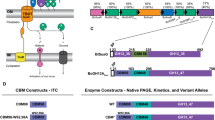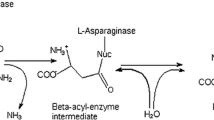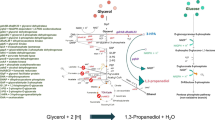Abstract
Aspergillus niger α-glucosidase (ANG), a member of glycoside hydrolase family 31, catalyzes hydrolysis of α-glucosidic linkages at the non-reducing end. In the presence of high concentrations of maltose, the enzyme also catalyzes the formation of α-(1→6)-glucosyl products by transglucosylation and it is used for production of the industrially useful panose and isomaltooligosaccharides. The initial transglucosylation by wild-type ANG in the presence of 100 mM maltose [Glc(α1–4)Glc] yields both α-(1→6)- and α-(1→4)-glucosidic linkages, the latter constituting ~25% of the total transfer reaction product. The maltotriose [Glc(α1–4)Glc(α1–4)Glc], α-(1→4)-glucosyl product disappears quickly, whereas the α-(1→6)-glucosyl products panose [Glc(α1–6)Glc(α1–4)Glc], isomaltose [Glc(α1–6)Glc], and isomaltotriose [Glc(α1–6)Glc(α1–6)Glc] accumulate. To modify the transglucosylation properties of ANG, residue Asn694, which was predicted to be involved in formation of the plus subsites of ANG, was replaced with Ala, Leu, Phe, and Trp. Except for N694A, the mutations enhanced the initial velocity of the α-(1→4)-transfer reaction to produce maltotriose, which was then degraded at a rate similar to that by wild-type ANG. With increasing reaction time, N694F and N694W mutations led to the accumulation of larger amounts of isomaltose and isomaltotriose than achieved with the wild-type enzyme. In the final stage of the reaction, the major product was panose (N694A and N694L) or isomaltose (N694F and N694W).




Similar content being viewed by others
References
Fersht A (1988) Structure and mechanism in protein science: a guide to enzyme catalysis and protein folding. W H Freeman and Company, New York
Hur KY, Lee M-S (2015) Gut microbiota and metabolic disorders. Diabetes Metab J 39:198–203. doi:10.4093/dmj.2015.39.3.198
Kaneko T, Kohmoto T, Kikuchi H, Shiota M, Iino H, Mitsuoka T (1994) Effects of isomaltooligosaccharides with different degrees of polymerization on human fecal bifidobactcria. Biosci Biotechnol Biochem 58:2288–2290. doi:10.1271/bbb.58.2288
Kohmoto T, Fukui F, Takaku H, Machida Y, Arai M, Mitsuoka T (1988) Effect of isomalto-oligosaccharides on human fecal flora. Bifidobact Microflora 7:61–69. doi:10.12938/bifidus1982.7.2_61
Kohmoto T, Fukui F, Takaku H, Mitsuoka T (1991) Dose-response test of isomaltooligosaccharides for increasing fecal bifidobacteria. Agric Biol Chem 55:2157–2159. doi:10.1080/00021369.1991.10870921
Kohmoto T, Tsuji K, Kaneko T, Shiota M, Fukui F, Takaku H, Nakagawa Y, Ichikawa T, Kobayash S (1992) Metabolism of 13C-isomaltooligosaccharides in healthy men. Biosci Biotechnol Biochem 56:937–940. doi:10.1271/bbb.56.937
Kothari D, Patel S (2014) Therapeutic spectrum of nondigestible oligosaccharides: overview of current state and prospect. J Food Sci 79:R1491–R1498. doi:10.1111/1750-3841.12536
Mäkeläinen H, Hasselwander O, Rautonen N, Ouwehand AC (2009) Panose, a new prebiotic candidate. Lett Appl Microbiol 49:666–672. doi:10.1111/j.1472-765X.2009.02698.x
Ren L, Qin X, Cao X, Wang L, Bai F, Bai G, Shen Y (2011) Structural insight into substrate specificity of human intestinal maltase-glucoamylase. Protein Cell 2:827–836. doi:10.1007/s13238-011-1105-3
Shimba N, Shinagawa M, Hoshino W, Yamaguchi H, Yamada N, Suzuki E (2009) Monitoring the hydrolysis and transglycosylation activity of α-glucosidase from Aspergillus niger by nuclear magnetic resonance spectroscopy and mass spectrometry. Anal Biochem 393:23–28. doi:10.1016/j.ab.2009.06.002
Sim L, Quezada-Calvillo R, Sterchi EE, Nichols BL, Rose DR (2008) Human intestinal maltase–glucoamylase: crystal structure of the N-terminal catalytic subunit and basis of inhibition and substrate specificity. J Mol Biol 375:782–792. doi:10.1016/j.jmb.2007.10.069
Söding J, Biegert A, Lupas AN (2005) The HHpred interactive server for protein homology detection and structure prediction. Nucleic Acids Res 33:W244–W248. doi:10.1093/nar/gki408
Song KM, Okuyama M, Nishimura M, Tagami T, Mori H, Kimura A (2013) Aromatic residue on β→α loop 1 in the catalytic domain is important to the transglycosylation specificity of glycoside hydrolase family 31 α-glucosidase. Biosci Biotechnol Biochem 77:1759–1765. doi:10.1271/bbb.130325
Tagami T, Okuyama M, Nakai H, Kim YM, Mori H, Taguchi K, Svensson B, Kimura A (2013a) Key aromatic residues at subsites +2 and +3 of glycoside hydrolase family 31 α-glucosidase contribute to recognition of long-chain substrates. Biochim Biophys Acta - Proteins Proteomics 1834:329–335. doi:10.1016/j.bbapap.2012.08.007
Tagami T, Yamashita K, Okuyama M, Mori H, Yao M, Kimura A (2013b) Molecular basis for the recognition of long-chain substrates by plant α-glucosidases. J Biol Chem 288:19296–19303. doi:10.1074/jbc.M113.465211
Tagami T, Yamashita K, Okuyama M, Mori H, Yao M, Kimura A (2015) Structural advantage of sugar beet α-glucosidase to stabilize the Michaelis complex with long-chain substrate. J Biol Chem 290:1796–1803. doi:10.1074/jbc.M114.606939
Takaku H (1988) Anomalously linked oligosaccharides mixture. In: The amylase research society of Japan (ed) Handbook of amylases and related enzymes. Pergamon press, Oxford, pp 215–217
Tan K, Tesar C, Wilton R, Keigher L, Babnigg G, Joachimiak A (2010) Novel α-glucosidase from human gut microbiome: substrate specificities and their switch. FASEB J 24:3939–3949. doi:10.1096/fj.10-156257
Acknowledgments
We thank the staff of the Instrumental Analysis Division of the Creative Research Institution at Hokkaido University for amino acid analysis. This study was supported in part by the JSPS KAKENHI Grant Number JP26292049 (Atsuo Kimura) and by the JSPS and NRF under the Japan-Korea Basic Science Cooperation Program (Atsuo Kimura).
Author information
Authors and Affiliations
Corresponding authors
Ethics declarations
This article does not describe any studies on human participants or animals performed by any of the authors.
Conflict of interest
The authors declare that they have no conflicts of interests.
Electronic supplementary material
ESM 1
(PDF 647 kb)
Rights and permissions
About this article
Cite this article
Ma, M., Okuyama, M., Sato, M. et al. Effects of mutation of Asn694 in Aspergillus niger α-glucosidase on hydrolysis and transglucosylation. Appl Microbiol Biotechnol 101, 6399–6408 (2017). https://doi.org/10.1007/s00253-017-8402-6
Received:
Revised:
Accepted:
Published:
Issue Date:
DOI: https://doi.org/10.1007/s00253-017-8402-6




